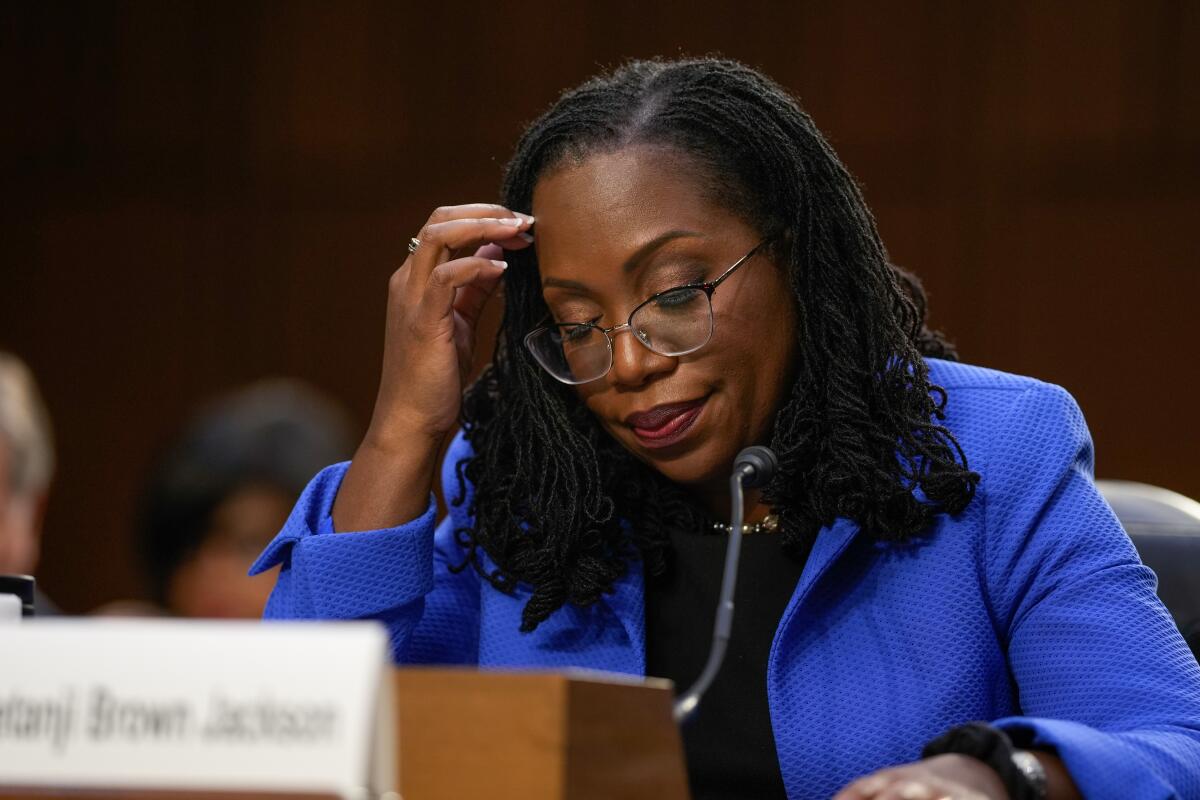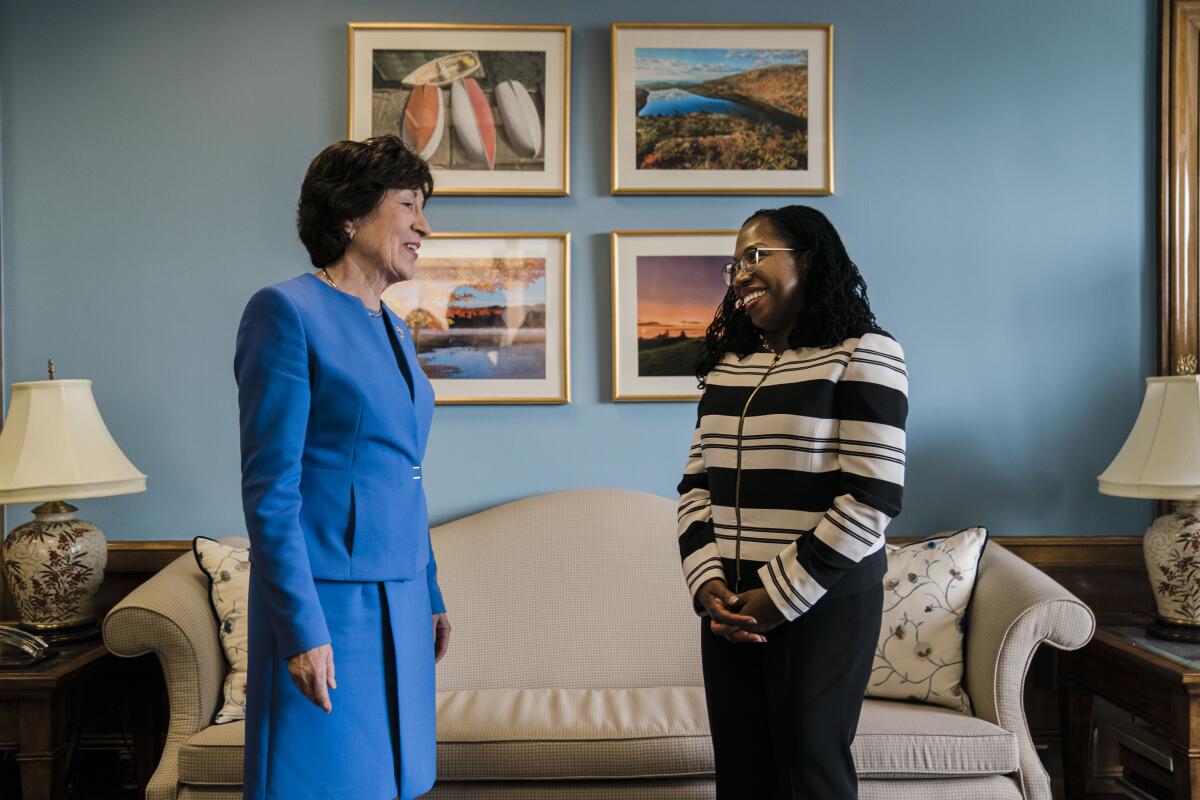Essential Politics: Why Republicans won’t back Judge Jackson, despite her popularity

- Share via
Before I came to Washington, I thought most lawmakers voted to reflect the will of a majority of voters. The confirmation process of Judge Ketanji Brown Jackson to the U.S. Supreme Court is further evidence that I was a little naive.
The Senate is likely to confirm Jackson, 51, this week as the first Black woman to serve as a Supreme Court justice, a historic appointment that would fulfill a promise President Biden made on the campaign trail and one that highlighted the stunning lack of diversity on the federal courts. Since the late 18th century, federal judicial data shows, just three of the nation’s 115 Supreme Court justices have been Black or Latina (two are serving today). Less than 2% of over 3,800 federal judges have been Black women.
The Senate on Monday voted 53 to 47 to advance her nomination from a committee to the chamber’s floor. The final confirmation vote is likely to mirror the procedural one, with just three Republicans likely to cross the aisle to put Jackson on the nation’s highest court.
In some ways, it’s not surprising that so few Republicans supported Jackson — the Supreme Court confirmation process has become an increasingly partisan affair. President Trump’s last two nominees drew virtually no Democratic support. (Democratic Sen. Joe Manchin of West Virginia was the only Democrat to back Brett Kavanaugh, and none voted for Amy Coney Barrett.)
The expected Senate vote for Jackson is revealing, in part, because the federal appeals court judge is among the most popular nominees to be considered for the Supreme Court in at least three decades.
Hello friends. I’m Erin B. Logan, a reporter for the L.A. Times. Today, we are going to talk about Jackson and why Republicans declined to back a nominee who has drawn support from 66% of Americans.
Get our L.A. Times Politics newsletter
The latest news, analysis and insights from our politics team.
You may occasionally receive promotional content from the Los Angeles Times.
The power of the base
Polling in recent years indicates that Supreme Court nominees aren’t very popular among Americans.
After Brett Kavanaugh‘s contentious 2018 confirmation hearing, which was marked by sexual assault allegations, just 46% of Americans supported his appointment, according to a Gallup poll. Just 51% of Americans in 2020 backed Amy Coney Barrett and 45% backed Neil Gorsuch in 2017.
Those figures were similar under justices appointed by Democratic presidents. Only 46% of voters backed Elena Kagan in 2010 and 55% backed Sonia Sotomayor in 2009 after their respective hearings.
Chief Justice John G. Roberts Jr. had support from 60% of Americans, the most of any nominee until Jackson. (Clarence Thomas, who survived a contentious confirmation hearing in 1991, drew 58% support.)
Before her hearings, Gallup reported that 58% of Americans supported confirming Jackson. A Marquette Law School poll after her hearings put that support at 66%. What else can 66% of Americans agree on? Not much.
It’s not hard to figure out why Senate Republicans are nearly unanimous in their rejection of Jackson. It’s right there in the same poll: Jackson is noticeably unpopular among Republicans. Though 95% of Democrats and 67% of independents support her nomination, just 29% of Republicans want her on the bench.
Those poll numbers put GOP lawmakers in a tight spot between the desires of their base voters and the broader electorate. Republicans’ awareness of the predicament was easy to find — their statements declining to vote for Jackson nonetheless lauded the historic nature of her appointment, the strength of her credentials and the poise she displayed during some intense Senate questioning.
In announcing his decision to vote against Jackson, for example, Sen. Tim Scott of South Carolina, the GOP’s only Black senator, said that the “historic nature of Judge Jackson’s nomination reinforces the progress our country has made.”
However, he added, “it is clear that Judge Jackson’s judicial philosophy and positions on the defining issues of our time make her the wrong choice for the Supreme Court.”
Sen. Ben Sasse of Nebraska threaded a similar needle in a statement, calling Jackson “an extraordinary person with an extraordinary American story.” Even so, Sasse said he could not support her nomination because he disagreed with her “judicial philosophy.”
Sen. Thom Tillis of North Carolina said he could not vote for Jackson out of concern she would “legislate from the bench.” Tillis took pains to note that the federal judge was “well qualified and her nomination as the first Black woman to the Supreme Court is historic” and said he was “impressed with her knowledge, her composure, and her character during more than twenty hours of questioning.”
Three Republicans — Susan Collins of Maine, Mitt Romney of Utah and Lisa Murkowski of Utah — said they would vote to confirm Jackson. In explaining their votes, the three Republicans said they believed the judge was qualified to serve on the high court. Collins in a statement noted that “Judge Jackson has sterling academic and professional credentials.”
Romney in a statement said she “more than meets the standard of excellence and integrity.”
Murkowski said she felt compelled to support Jackson because she was rejecting “the corrosive politicization of the review process for Supreme Court nominees, which, on both sides of the aisle, is growing worse and more detached from reality by the year.”
Her vote could be a risky one, however. Murkowski is running for reelection and faces a right-wing primary challenger who wasted little time in blasting the senator over her decision.

Our daily news podcast
If you’re a fan of this newsletter, you’ll love our daily podcast “The Times,” hosted every weekday by columnist Gustavo Arellano, along with reporters from across our newsroom. Go beyond the headlines. Download and listen on our App, subscribe on Apple Podcasts and follow on Spotify.
The latest from the campaign trail
— Georgia gubernatorial candidate Stacey Abrams is now a millionaire, the Associated Press reported. When she ran for governor in 2018, her lackluster personal finances and a hefty tax bill from the IRS gave Republicans fodder to question how she could manage a state budget when she struggled with her own debts. Abrams is now worth $3.17 million, according to state disclosures she filed in March.
—Former Alaska Gov. and Republican vice presidential nominee Sarah Palin on Friday shook up the race for Alaska’s lone U.S. House seat, filing paperwork to join a field of at least 40 candidates seeking the job, the Associated Press reported. It had been held for 49 years by U.S. Rep. Don Young, who died last month. The field includes current and former state legislators and a North Pole City Council member named Santa Claus.
Enjoying this newsletter? Consider subscribing to the Los Angeles Times
Your support helps us deliver the news that matters most. Become a subscriber.
The view from Washington
— Former President Obama on Tuesday returned to the White House for the first time since leaving office to celebrate the 12th anniversary of his landmark healthcare law, which Biden is planning to bolster, Times writer Eli Stokols reported. Biden signed an executive order to make healthcare more accessible and affordable while the Treasury Department introduced a rule that, if finalized, would make 5 million families eligible for subsidies to reduce costs associated with employer-based plans.
—Ivanka Trump, one of those closest to her father during the insurrection at the U.S. Capitol, testified before the House panel investigating the Jan. 6, 2021, attack, the Associated Press reported.
— Senate bargainers on Monday agreed on a slimmed-down $10-billion package for countering COVID-19 with treatments, vaccines and other steps, the top Democratic and Republican negotiators said, but the measure dropped all funding to help nations abroad combat the pandemic, the Associated Press reported.
The view from California
— Former GOP legislative leader Connie Conway was leading Tuesday night in a special election to replace Rep. Devin Nunes. Two Democrats were vying for the second spot, according to preliminary elections results from Fresno and Tulare counties, Times writers Seema Mehta and Priscella Vega reported. If one of the six candidates for the San Joaquin Valley congressional seat receives more than 50% of the vote, that person wins the race outright. Otherwise, the top two candidates enter a runoff.
—A federal judge’s extraordinary assertion last week that former President Trump likely committed felonies connected to the Jan. 6 Capitol insurrection marked a milestone for the House committee investigating the attack, Times writers Sarah D. Wire and Melanie Mason reported. It also underscored the perilous stakes California attorney John Eastman, who has emerged as one of the key figures in the congressional probe. Eastman was the architect of the legal theory at the root of Trump’s attempt to overturn the presidential election, a plan that U.S. District Judge David O. Carter, who serves on a federal court in Santa Anna, denounced as obviously illegal.
Sign up for our California Politics newsletter to get the best of The Times’ state politics reporting.
Stay in touch
Keep up with breaking news on our Politics page. And are you following us on Twitter at @latimespolitics?
Did someone forward you this? Sign up here to get Essential Politics in your inbox.
Until next time, send your comments, suggestions and news tips to politics@latimes.com.
Get the L.A. Times Politics newsletter
Deeply reported insights into legislation, politics and policy from Sacramento, Washington and beyond. In your inbox twice per week.
You may occasionally receive promotional content from the Los Angeles Times.




